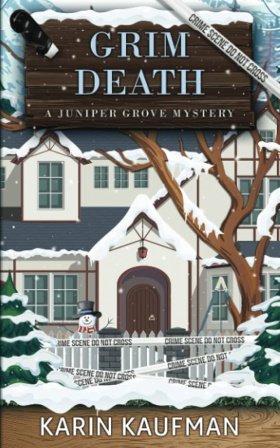“Do painters?” Shasta asked.
The room fell silent.
Shasta glanced around the table, mischief in her eyes. “It’s a fair question.”
“Libel laws don’t apply to art,” Isak said. His left arm moved, and from where I sat it looked as though he was reaching out under the table, begging Shasta to drop it.
“Interesting question,” Charlotte said. “I should ask around my law firm.”
“Your law firm?” Isak said, giving Charlotte a sly smile and his beard a scratch. “You passed the bar already?”
Undeterred, Charlotte continued. “They once represented a Loveland sculptor who was charged with copying a figure from an advertisement in one of his sculptures and not crediting the ad company.”
“Did the sculptor win?” Isak asked.
“He did.”
Dalton chuckled. “Of course he did. Here’s my take on it. A painting, like a sculpture, is a work of art. It’s an opinion—or point of view, if you will. Like the editorial page of the Post, only easier on the eyes and rarely used for birdcages.” He spoke in a breathy, New England-tinged accent, slowly and carefully, as though he were drawing connections for children.
“What if fiction is intended to look like fact?” Shasta asked. “Or the other way around. Fact intended, or let’s say hidden, to look like fiction?”
Clay’s hand flew into the air. “Pass me the bacon, Brodie?” He looked like an overeager schoolboy. “Anyone want more? I can easily whip some up. Eggs, too. I see we’re out of scrambles.”
“I’ll take some more coffee,” I said.
Clay smiled at me, his expression a mixture of gratitude and supplication, and then headed for the kitchen. His discomfort had something to do with Dalton’s paintings, I was sure. Perhaps he hadn’t finalized the showing at his new gallery, and every time one of his guests made a not-so-oblique reference to Dalton’s work, Clay sensed the opening was under threat.
But Dalton clearly held us all, probably even Clay and Isak, in disdain. He oozed self-importance. People like that were asking to be slapped back. Figuratively, of course.
I decided to steer the conversation in another direction. “Brodie, what brought you to Juniper Grove?”
“I missed the mountains, I guess. That’s part of it.”
“You’re from Colorado?”
“Idaho. Plus, the Post offered me an opportunity I didn’t have in Nebraska. The hierarchy was settled there. The people above me weren’t going anywhere. I was a reporter and I was going to stay a reporter. Thing is, even though the Post is a lot smaller than the Lincoln Daily News, I don’t think the News will be around five years from now. The Post is forward looking. The owner wants it to grow into a northern Colorado paper, and he wants to expand the online presence.”
“Sounds like a smart move,” I said. “Looking ahead to where you want to be years from now.”
He laughed. “Time will tell if it was smart, but whatever happens, I’m glad I moved.”
Clay appeared, poured my coffee, and began to work his way around the table again, asking with raised eyebrows if guests wanted a refill.
“No, thanks,” Charlotte said.
“So your old Nebraska paper doesn’t have an online version?” Isak asked. “I thought they all did.”
“They do, but they don’t take advantage of it,” Brodie replied. “They don’t fully monetize their online presence.”
“The Post does,” Clay said. “Mary tells me online subscriptions have gone up lately, and so has ad revenue.”
Brodie looked proud, as though he’d played a major hand in both upswings. “More than a hundred new subscriptions in the past six weeks alone—and at a time when many newspapers are losing subscribers.”
“That’s impressive,” Charlotte said. “Maybe you were smart to leave Nebraska.” She flashed another crooked smile.
“All of one hundred subscriptions, dear me,” Dalton echoed. “But then again, this is Juniper Grove.”
Brodie glared at him and shoved more croissant in his mouth.
“Oh, Dalton,” Shasta said, her words dripping with sympathy, “how tragic your life must be. That’s the only explanation.”
Missing Shasta’s irony, Charlotte shook her head. “You’re joking. He leads a privileged life.”
I had to admire Shasta’s continued jabs and ripostes, though I did wonder if she realized she might be putting Isak’s art gallery dream in danger.
Trying again to steer the conversation toward pleasant pastures, I turned to Mary. She was staring ahead, her unfocused gaze signaling a secret distress. “Mary, I love the idea of mercury glass vases for the table. And all the white and green—it’s so fresh and wintry.”
“Sorry? What did you say?”
“I love the whole layout of the table. It’s perfect for January.”
“Thanks, Rachel. Laura helped. She has an artist’s eye.”
“Well, I’m stealing it for our next party,” I said. “That all right with you, James?”
“Yup,” he said.
By that point I was so uncomfortable that I practically buried my face in my coffee cup and then took a long, drawn-out sip, eyes down.

























